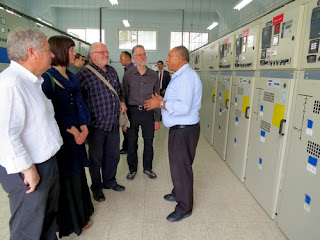Nick and I unfortunately had to leave our companions after just one week, due to other commitments back home. Our flight from Tel Aviv to Frankfurt was scheduled to leave at 04.30 on Tuesday morning so our wonderful guide and fixer of problems, Shaden had arranged for us to be picked up in Nablus shortly after midnight.
After our sad farewells we set off for the airport. This should be a fairly straightforward journey as Nablus is not very far away from Tel Aviv. In addition our driver, Karim, is a Samaritan and has an Israeli ID card and his taxi has an Israeli number plate.
What could be more straightforward. Well, almost anything as it turned out. On this short journey we were stopped twice, both times by gun carrying soldiers. The first was on leaving the (Illegal) Israeli settlement of Ariel. There we had to open our suitcases as the guards somehow found my book "A Sunday at the pool in Kigali" a potential threat to Israel - even though none of the guards appeared to speak or read English.
The soldiers were also inquisitive about a ceramic dish I was carrying home. They decided to exhume Nick’s toilet bag, just in case he was carrying some giant open razor. Alas they found nothing and we allowed to continue our journey. The whole thing was rather silly.
Once in Israel proper we were again stopped at another checkpoint outside Tel Aviv airport. This time it was a bit more scary. We didn’t have to get out of the car, but the gun carrying guard was very persistent and intensive in his questioning of just why we had been visiting Nablus. Nick was the one who bore the brunt of their questioning. The concept of twinning and making friends was clearly beyond the salary grade of this particular guard.
We didn’t really know the full names of any of our hosts in Nablus, apart from Mr Yahya Arafat, and we felt this was probably not a good name to divulge. In the end they were happy with the names of Shaden, Riyad and Ahmad.
This time Karim our driver was also intensively questioned and he had to go into the little cabin to get his ID checked. Eventually we were waved on. The stop did not last all that long, but the uncertainty was very unsettling. Especially with guns around.
We kept thinking what could they do - send us back to Nablus? Arrest us for making friends with Palestinians?
That we did make it through to the airport on time was in no small part due to our very own personal Good Samaritan, Karim. He was aware of the possibilities and kept telling the Israelis that we were his friends and that we had visited his village just outside Nablus. Without his help, not sure how it would have all ended. Cannot image an Israeli taxi driver from Tel Aviv (the other option open to us) would have been so kind and helpful.
But inshallah, we did make it to the airport and there were funnily enough no problems in there. We just sailed through security. Our thanks to Karim and it is so good to know that the kind and friendly traditions of the Samaritans are still alive and kicking in 21st century Palestine. Pity that they seem to have disappeared in Israel.
(Contributed by Alister)



























